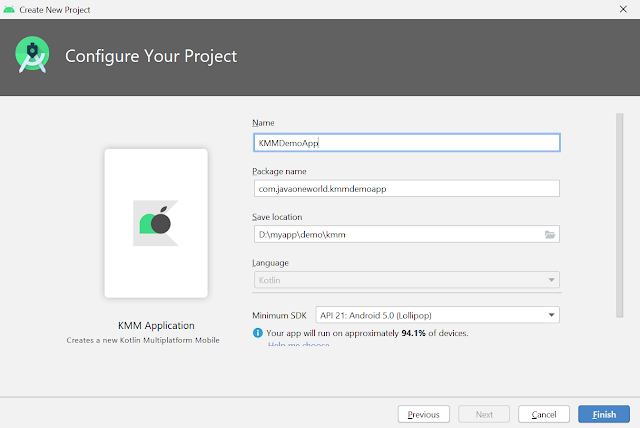Kotlin Multiplatform Mobile (KMM)
Kotlin Multiplatform Mobile (KMM) is an SDK that permits you to utilize a similar business rationale code in both iOS and Android applications.

KMM is now in Alpha, and you can begin sharing business rationale in your versatile applications with it immediately.
It incorporates the new KMM Plugin for Android Studio,
which permits you to compose, run, test, and debug shared code in the equivalent IDE.
Join such incredible groups as VMWare, Autodesk, and Yandex who are sharing code in their versatile applications utilizing Kotlin. It has never been so natural!
What is Kotlin Multiplatform Mobile (KMM) :
Kotlin Multiplatform Mobile (KMM) is an SDK for cross-platform mobile app development gave by JetBrains. It utilizes the multiplatform abilities of Kotlin and incorporates different apparatuses and highlights intended to make the start to finish understanding of building portable cross-platform applications as pleasant and productive as could reasonably be expected.
The Android and iOS renditions of an application frequently share a great deal practically speaking, yet they can likewise contrast altogether – particularly as far as their UI – from inconspicuous varieties in scrolling behavior to totally unique navigation logic. Simultaneously, the application's business logic, including such highlights as data management, analytics, and verification, is regularly indistinguishable. That is the reason it's normal to share a few pieces of an application across stages while keeping different parts totally independent.
With KMM, you can get this adaptability and hold the advantages of local programming. Utilize a solitary codebase for the business logic of iOS and Android applications and compose stage explicit code just where it's vital, to execute a local UI or when working with stage explicit APIs.
Have fun to develop Mobile app with KMM:
KMM is still very new to the portable improvement world, yet we accept that it is a genuine distinct advantage.
That is the reason they allotted a different group inside Kotlin to push KMM advance and give the best engineer understanding to the making of cross-platform portable applications with Kotlin.
KMM is flawlessly coordinated with your portable task. Common code, written in Kotlin, is compiled to JVM bytecode with Kotlin/JVM and to local pairs with Kotlin/Native, so you can utilize your KMM business-logic modules simply like some other normal versatile library.
Sharing Kotlin code between portable stages has just spared a great deal of time and exertion for some organizations. Here are some motivating stories:
Quizlet:
moved their business logic from a mutual JavaScript way to deal with KMM and radically improved the exhibition of both their Android and iOS applications.
Fastwork :
presented KMM for the domain and information layers of their application to share the business rationale and API administration between versatile stages, essentially boosting their group's profitability.
Yandex:
Disk began by trying different things with the joining of a little component, and when the examination demonstrated effectively, they actualized their entire information synchronization rationale in KMM.
Configure Environment for KMM:
KMM plugin gives you the option, so now,
you can write, run, test, and debug shared code in Android Studio, without switching to other IDEs. To install it, select Preferences | Plugins, search for the Kotlin Multiplatform Mobile plugin in Marketplace and press the Install button.
Lets Start with App Development:
With the New Kotlin Multiplatform Mobile Project wizard, you can create a ready-to-run mobile application project with a shared codebase in just a few clicks. To see how it works on both platforms, just select the run configuration you need and click the Run button.
- Very first install Kotlin Multiplatform Mobile plugin in your android studio.
- Android Studion version 4.1 (RC 1 or higher). You can also use version 4.0, but the KMM plugin for this version has some limitations
- Update the Kotlin plugin to version 1.4.0 or higher.
- You can use Android Studio for creating your multiplatform applications and run them on simulated or hardware devices.
- If you want to write iOS-(specific) code and run an iOS application, install Xcode – version 11.3 or higher.
- Most of the time, Xcode will work in the background. You will use it to add Swift or Objective-C code to your iOS application.









No comments:
Post a Comment